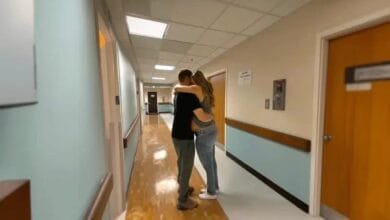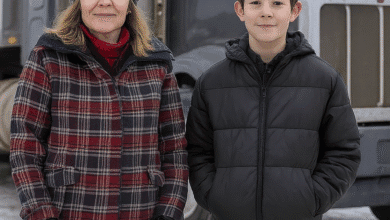I Gave Shelter to a Homeless Woman in My Garage – Two Days Later, I Looked Inside and Cried, “Oh God! What Is This?!”

My name is Henry. I’m thirty years old, and I’ve been living alone in the house where I grew up ever since my mom passed away last year. The house felt too quiet, too big… too empty. I kept myself distracted with work, my girlfriend Sandra (we weren’t living together yet), and day-to-day routines.
Then, one rainy evening, I saw her.
She was sitting hunched on a sidewalk, under a dim streetlamp, soaked to the bone. She looked to be in her late fifties or early sixties. Something about her face and eyes reminded me of my mom.
On instinct, I approached her.
“Hey, why don’t you find a shelter somewhere?”
She turned her head slowly toward me and replied, “I’m tired of going from one shelter to another. It’s pointless, son.”
Without thinking, I blurted out, “If you’re tired of that, you can stay in my garage.”
She blinked. “Your garage?”
I nodded.
“It’s not as bad as it sounds. There’s a small room in there — old but livable. Has a toilet, a bed, running water. It’s messy, but I’ll clean it up this weekend. It used to be where my mom’s caregiver stayed.”
She paused and then said, “Well, I’ve got nothing left to lose. Alright. I’m Dorothy.”
“I’m Henry. I’ve just picked up some food. My car’s around the corner — come with me.”
And just like that, I brought a stranger home.
The next morning, I let Dorothy rest. Later that day, I told Sandra.
“You let a homeless woman move into your garage? Henry, what if she’s dangerous?” she exclaimed while putting the kettle on.
“She’s not dangerous,” I replied.
“She could be,” Sandra said with a pout.
“She was in a bad place. I just wanted to help. I locked the door to the house — if she steals anything, it’ll just be garage junk.”
“You’re too trusting,” she muttered, handing me a plate. “You should’ve come stay with me instead.”
“It’s not like that. Look, you can meet her. I gave her some snacks and will leave more food later. Tomorrow I’ll check on her.”
“If she’s still there,” Sandra added.
“I really don’t think she’s as bad as you think,” I said.
That Sunday morning, I woke with a strange feeling. Dorothy had been quiet — too quiet. I walked to the garage window and peeked in.
I froze.
The garage was unrecognizable.
The clutter was gone. The room looked almost cozy. The dust was gone, the floor swept. And there she was — Dorothy — sitting at the table wearing a clean, vintage-looking dress.
She didn’t look homeless at all. She looked… elegant.
A chill crept down my spine.
I opened the door and blurted out, “Oh God! What is this?!”
Dorothy looked up calmly.
“Ah, Henry. You’re back,” she said.
“How… how did you do all this?” I stammered.
“I just cleaned up. It’s nice to have a space of my own again,” she smiled. “You had good things buried under the mess. The lamp just needed a new bulb — I found one in a box. The plant? I grabbed it from outside to brighten things up.”
“Who are you?” I asked, confused.
“That’s a long story,” she said.
“I’ve got time.”
She nodded slowly. “I used to be a professor. English literature.”
“You were a professor? Really?”
“Long ago. Before I lost everything.”
She continued, not looking at me — maybe that made it easier.
“My parents died in a car crash when I was in my thirties. A truck ran a red light. It was unreal… like watching my life fall apart.”
“I dove into work. Later, I married Jack and we had a son, David.”
“One night, we were driving to get ice cream. Jack was driving, David in the backseat. We were laughing — it had been a good day.”
She stopped and swallowed hard.
“We never saw the other car coming.”
I didn’t say a word. Just listened.
“I remember screaming,” she whispered. “I remember holding David. He was still warm… and then he wasn’t.”
My chest tightened.
“After that, I became a ghost. I lost my job, stopped answering calls, let the bills pile up. One day I blinked, and everything was gone — my home, my career, my life.”
“That’s… devastating,” I murmured.
“And I just let it happen,” she added.
Dorothy looked at me with sharp, unreadable eyes.
“This is too much, Henry.”
“This is not enough, Dorothy,” I said.
Later, Sandra met her.
“She’s different than I expected,” Sandra admitted. “She’s sharp, kind, and honestly? Her grammar’s better than both of ours combined.”
“I told you,” I smiled.
Months later, Dorothy got a job at the local library. Within a year, she moved into her own small apartment.
One night, I visited her. She had a cup of tea ready and books lined up neatly on shelves.
“You made it, Dorothy,” I said.
She smiled. “We made it, Henry.”
And in that moment, I realized—
Sometimes, all someone needs is a small act of kindness.





